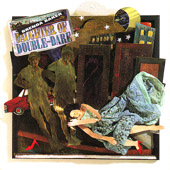Daughter of Double-Dare
Reviews
The Leader-Post, Regina
November 29, 1993
Review by Patrick Davitt, Entertainment Editor
Win, lose or draw — and she should win — Brenda Baker deserves all the credit in the world for making an album like Daughter of Double-Dare.
Baker has body, soul, hopes and dreams riding on this album. Also, a not inconsiderable amount of cash.
A lot of artists in her situation would have played safe by making a commercially careful album.
But she has opted instead to make an ambitious, experimental, highly personal album — the kind of work that doesn’t soothe the listener but demands close attention to word and nuance.
And rewards it.
Oddly, for someone with Baker’s proven musical ability, some of the most moving, effective works among the 18(!) here are partially or entirely spoken word, giving the album the feel of a performance art piece.
“an ambitious, experimental, highly personal album”
In fact, the album opens intriguingly with the surreal title track, whose ethereal musical chorus gives way to a spoken word short story, while sound effects rattle and hiss and squeal in the background.
Much of the spoken word content is overtly humorous, an excellent vehicle for Baker’s sharp eye and quick wit.
God Wears Sunglasses, near the end of the album, is a delicious bit of satire, disguised as earnest reportage of an encounter with a Los Angeles “ministry” that’s sponsoring a Christian rock band.
Anyone who has ever talked with a rock promoter or manager will recognize how perfectly Baker has captured their blarney. The bit has a delightful comic climax, too, when the narrator deftly turns around the manager’s pious self-serving history of how the musicians were saved from drugs.
On Tattoos, Poetry, Genius and the Natural Order of Things, is a funny dissertation on the fleeting nature of inspiration.
Man of My Dreams opens with a phone snippet: “You won’t believe what happened.” Probably not, but it’s fun trying. It’s another funny story, this one with the moral: Don’t lose your head over a man.
“a delicious bit of satire”
There are many moments of delightful music as well.
This Room, which will be the first single in January, is a great performance of a fine song. It opens with producer Rob Bryanton’s echoey, discordant piano under Baker’s close-miked vocal, and features cool backing vocals by Bryanton and Regina singer Roberta Nichol, as well as thoughtful guitar solo by Jack Semple.
The lyric is moving and personal, as Baker sings about a lost love, specifically how she can “throw away the letters and that cheap perfume,” but not the memories of intimate moments.
Her vocal on Love I Can Live With has a strong flavor of Joni Mitchell, and another interesting, clever lyric about maturity in love, and its changing nature, from intensity — “the thrill of the chase… fascination or rage” — to gentleness, a love that “calms me with a single kiss.”
Letter By Letter is a pretty song declaring a “collective vow” of solidarity and continued action to end the persecution of the world’s political prisoners, with nice harmony vocals by Joan Speirs and Nichol, who also score in Bryanton’s gorgeous a cappella vocal arrangement of Call Yourself A Woman.
The ambitious Whatcha Call Insane opens with a sound montage relating to the infamous Montreal Massacre as prologue to a mid-tempo synth-based song that develops into a pulsing post-funk. Semple’s guitar accents sizzle through it.
And Cindy is another highlight, a perceptive story of a young Regina streetwalker wondering about her life on a night when “it’s 26 below/(And) the cars aren’t slowing down…”
“Bryanton’s gorgeous vocal arrangement”
Sadly, Cindy’s ambitions have narrowed to a warm bath and a fix, and maybe, long-term, a move to Vancouver, “where it’s not so bloody cold/ And the young ones make a fortune, she’s been told.”
Not everything works this brilliantly, of course. Baker’s clear singing voice is sometimes overloaded with unnecessary reverb.
And Baker loses her normally sharp focus on the sadly beautiful Bye-Bye Becky, which loses its personal feeling when Baker climbs up on the soapbox; her references to “a moral minority: and “government” are too heavy handed, and unworthy of the song’s heretofore subtle power.
And The Riot Girls, about women in rock and roll, feels only about half-finished. Its music — ersatz hard rock — is so wide of the mark it’s almost funny.
But even these songs offer more intelligence and thoughtfulness than about 99 per cent of what you’ll hear on your radio these days.
And that means listening to all the songs on Daughter of Double-Dare isn’t easy. But you will soon get the idea that Brenda Baker didn’t mean for it to be easy; she meant for it to mean something.
